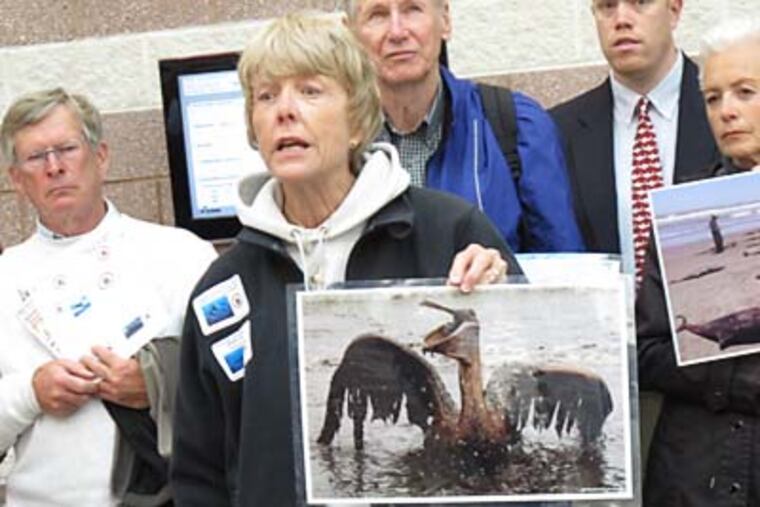
ATLANTIC CITY - Environmentalists, fishermen, surfers and others lashed out at a proposal Friday to allow companies to test for undersea deposits of oil and natural gas from Delaware to Florida.
At a hearing held by the U.S. Bureau of Ocean and Energy Management, opponents of the proposal vastly outnumbered supporters, who were mainly business groups that say expanded drilling would help America reduce its dependence on foreign oil.
The agency, part of the U.S. Department of the Interior, plans a final decision by December.
Many of the objectors said testing techniques, including the use of undersea air guns and so-called boomers, would kill marine mammals, chase away fish stocks, and threaten endangered Atlantic right whales.
The testing would involve towing air guns behind survey ships, blasting sound waves through the ocean into the sea bed to pinpoint locations of oil and gas deposits.
"You are here at the real Jersey Shore, where we fiercely defend our ocean," said Cindy Zipf, executive director of Clean Ocean Action. "You come here and say you want to blast our ocean at levels loud enough to kill? We're offended."
John Weber of the Surfrider Foundation likened the testing procedures to undersea warfare.
"Imagine somebody lighting a stick of dynamite every 10 minutes for weeks on end," he said. "That's what we're doing to the ocean. Let's not pretend this is about anything other than offshore oil drilling. They don't want to look just to look; they want to look because they want to drill."
Gregory Auriemma of the Sierra Club agreed.
"This is the camel's nose under the tent, the first step toward opening up all these areas for oil and gas exploration," he said.
The East Coast has been off-limits to drilling for decades, but the Obama administration has recently been open to considering drilling in the area. The ocean management bureau said Friday that it has applications for seismic testing in 11 locations off the East Coast.
Michael Drulis of the New Jersey Society for Environmental Economic Development, a union- and business-backed group, supports the testing.
"Economic growth and environmental protection are not mutually exclusive," he said. "America's natural gas and oil reserves are the linchpin of our economy."
Michael Egenton of the New Jersey State Chamber of Commerce said new drilling was needed to create jobs and reduce importation of foreign oil.
"No economic recovery can be experienced without a viable energy policy," he said.
James Lovgren, a commercial fisherman from Point Pleasant Beach, said that if every barrel of oil were pumped from the East Coast sea bed, it would reduce gasoline prices by only 3 cents a gallon - and would take 20 years to do so.
He also called it hypocritical that different branches of the federal government seem to be taking contradictory stances when it comes to protecting marine life. He said the Bureau of Ocean and Energy Management plan anticipates the deaths of thousands of marine mammals, yet noted federal marine fisheries enforcers levy fines for harming or killing the very same animals - even if it happens by accident.
"Why can Big Oil kill anything it wants, but the poor little fisherman gets crucified if he even looks cross-eyed at a whale or a dolphin?" Lovgren asked.
Two of the three options under consideration would mandate a halt to testing when right whales or sea turtles are present.
Opponents also noted the prevailing ocean currents would likely carry oil spilled in an accident up the entire East Coast, all the way to the rich Georges Bank fishery between Massachusetts and Canada.